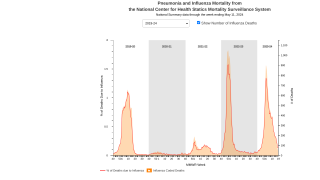Flu Shots and Miscarriages Are Un-Related Says CDC

A new study presented at a February 27, 2019 meeting of the Advisory Committee on Immunization Practices (ACIP), reported there is ‘no link between influenza vaccines and miscarriages.’
As reported by Helen Branswell with Stat News, this new finding contradicts a previous, small, observational study by the same researchers.
The new study was much larger and specifically designed to look at the flu shot-miscarriage relationship.
Additionally, earlier studies did not find a link between flu vaccination and miscarriage.
This means the ACIP committee, which guides vaccine policy for the Centers for Disease Control and Prevention (CDC), has not changed the recommendation for influenza vaccination of pregnant women.
The CDC and ACIP recommended that pregnant women get a flu vaccine during any trimester of their pregnancy because flu poses a danger to pregnant women and a flu vaccine can prevent influenza.
“For women who are wondering if it’s safe to get a vaccine in early pregnancy, we can say unequivocally, ‘Yes, it is safe,’” said Dr. Edward Belongia, who was part of the research team and who heads the Center for Clinical Epidemiology and Population Health at Wisconsin’s Marshfield Clinic.
The CDC does say the influenza virus is more likely to cause severe illness in pregnant women than in women of reproductive age who are not pregnant.
This is because of changes in the immune system, heart, and lungs during pregnancy make pregnant women, and women up to 2 weeks postpartum, more prone to severe illness from flu, including illness resulting in hospitalization.
Recently, on February 21, 2018, the CDC released the updated 2019 child/adolescent/adult immunization schedules.
Key Changes for the Child/Adolescent Immunization Schedule are as follows:
- MenHibrix (Hib-MenCy). This vaccine has been removed from the schedule as it is no longer available.
- Hepatitis B vaccine (HepB). The HepB footnote was revised to include information regarding vaccination of infants weighing < 2000 g born to HBsAg-negative mothers. These infants are recommended to receive the birth dose of HepB at chronological age 1 month or hospital discharge.
- Measles, mumps, and rubella vaccine (MMR). The MMR footnote was updated to include guidance regarding the use of the third dose of mumps-containing vaccine during a mumps outbreak. Persons ≥ 12 months who previously received ≤ two doses of mumps-containing vaccine and are identified by public health authorities to be at increased risk during a mumps outbreak should receive a dose of mumps virus–containing vaccine.
- Polio vaccine. The inactivated poliovirus rows of the catch-up schedule have been edited to clarify the catch-up recommendations for children 4 years of age and older, and the poliovirus vaccine footnote was revised to include updated guidance for persons who received oral polio vaccine as part of their vaccination series.
- Rotavirus vaccine. The maximum ages for administration of the first dose (14 weeks, 6 days) and last dose (8 months, 0 days) of the rotavirus series have been added to the rotavirus vaccine row of the catch-up schedule.
Key Changes to the 2019 Adult Immunization Schedule Changes are as follows:
- MMR: Administer one dose of MMR to adults who previously received ≤ two doses of mumps-containing vaccine and are identified by a public health authority to be at increased risk during a mumps outbreak.
- Zoster vaccines: Administer two doses of recombinant zoster vaccine (RZV; Shingrix®) 2-6 months apart to adults age 50 years or older, regardless of a past episode of herpes zoster or receipt of zoster vaccine live (ZVL; Zostavax®).
- Note: ZVL has replaced the term HZV (herpes zoster vaccine) that was used in past adult immunization schedules to refer to the live zoster vaccine.
- In adults who previously received ZVL, administer two doses of RZV 6 months apart, at least 2 months after the dose of ZVL.
- For adults, age 60 years or older, administer either RZV or ZVL, though RZV is preferred.
- Meningococcal vaccine. MPSV4 (4-valent meningococcal polysaccharide vaccine) is no longer available and has been removed from the adult immunization schedule.
For further guidance on the use of each vaccine included in the schedules, healthcare providers should refer to specific ACIP vaccine recommendations.
In the USA, most pharmacies offer vaccination services. To schedule an appointment with a pharmacist visit this site.
The CDC Vaccine Price List provides private sector vaccine prices for general information. Vaccine discounts can be found here.
Vaccines, like any medicine, can have side effects, says the CDC. You are encouraged to report negative side effects of vaccines to the FDA or CDC.
Our Trust Standards: Medical Advisory Committee


























